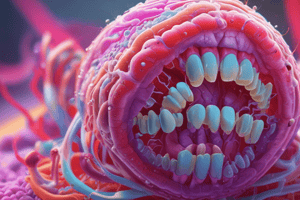Podcast
Questions and Answers
What are the three primary levels of cell organization mentioned in the text?
What are the three primary levels of cell organization mentioned in the text?
- Proteins, lipids, nucleic acids
- Cells, organelles, proteins
- Organelles, membranes, tissues
- Organelles, membranes, macromolecules (correct)
Which organelle is responsible for energy production in cells?
Which organelle is responsible for energy production in cells?
- Endoplasmic reticulum
- Nucleus
- Mitochondria (correct)
- Ribosomes
What is the waste product resulting from amino acid catabolism in cells?
What is the waste product resulting from amino acid catabolism in cells?
- Water
- Carbon dioxide
- Glucose
- Urea (correct)
Which organ in the human body primarily removes urea as a waste product?
Which organ in the human body primarily removes urea as a waste product?
What is the function of membranes in cells as mentioned in the text?
What is the function of membranes in cells as mentioned in the text?
Which macromolecule constitutes the bulk of cellular composition?
Which macromolecule constitutes the bulk of cellular composition?
Where does kidney filtration occur in the human body?
Where does kidney filtration occur in the human body?
What is the key waste product extracted by the kidneys?
What is the key waste product extracted by the kidneys?
Where does pulmonary gas exchange primarily occur in the human body?
Where does pulmonary gas exchange primarily occur in the human body?
Which organ is responsible for the removal of carbon dioxide from the body?
Which organ is responsible for the removal of carbon dioxide from the body?
What is the main function of nephrons in the kidneys?
What is the main function of nephrons in the kidneys?
Which cellular process generates carbon dioxide as a byproduct?
Which cellular process generates carbon dioxide as a byproduct?
Flashcards are hidden until you start studying
Study Notes
Cell Biology and Human Excretion: Exploring Two Aspects of Life
Cell biology delves into the fundamental processes governing the function and behavior of cells—the building blocks of life. Conversely, human excretion refers to waste management systems in both our bodies and society. To shed light on these essential components of life, let's examine each through the lens of modern biology and their connections.
Cellular Basics
Cells perform structural, metabolic, and regulatory tasks required for life. Their organization reflects three primary levels: organelles, membranes, and macromolecules. Organelles serve specialized roles like energy production (mitochondria), protein synthesis (ribosomes), and DNA maintenance (nucleus). Membranes surround cells and organelles, regulating interactions among cell components and controlling substance movement across boundaries. Macromolecules comprising proteins, lipids, nucleic acids, and carbohydrates constitute the bulk of cellular composition.
Excreting Cellular Byproducts
Cellular processes generate various products or waste molecules that must be removed to prevent toxic accumulations inside cells. Examples include carbon dioxide expelled during respiration and urea resulting from amino acid catabolism. Humans manage cellular waste via the kidneys (urea) and lungs (carbon dioxide), highlighting parallels between individual physiology and ecosystem functionality.
Renal System Overview
Our kidneys act as filters to maintain homeostasis. They extract waste products (e.g., urea) and excess water, forming urine that passes through the ureters to storage bladders before elimination from the body. Kidney filtration occurs in nephrons, small functional units consisting of glomeruli and tubules responsible for the exchange, absorption, secretion, and concentration of solutes and water.
Lung Function
Humans exhale carbon dioxide daily—a key product generated during aerobic cellular respiration. Pulmonary gas exchange happens in lung tissue, predominantly the alveoli. These minute sacs facilitate the diffusion of oxygen (O₂) into blood capillaries and carbon dioxide (CO₂) removal into the atmosphere.
Understanding cell biology and human excretory systems sheds valuable insights into life's inner workings. The former reveals complex processes driving cellular functioning, while the latter illustrates profound links unifying biochemistry and environmental science.
Studying That Suits You
Use AI to generate personalized quizzes and flashcards to suit your learning preferences.




